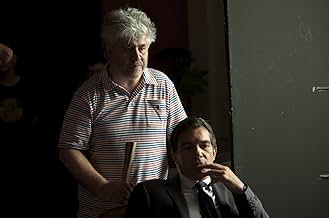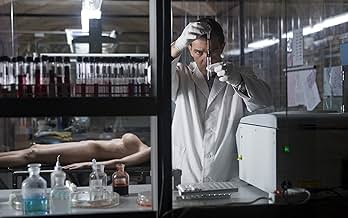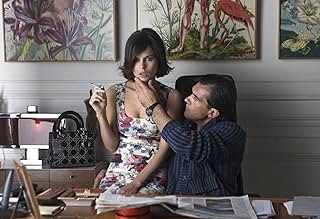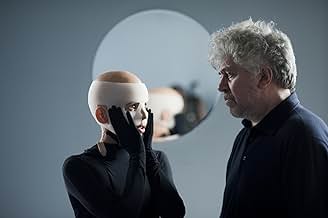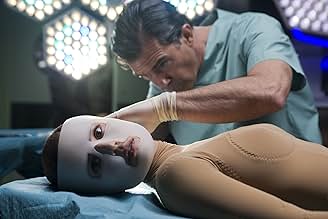Perseguido pelos erros do passado, um brilhante médico cria uma pele sintética que é resistente a qualquer coisa.Perseguido pelos erros do passado, um brilhante médico cria uma pele sintética que é resistente a qualquer coisa.Perseguido pelos erros do passado, um brilhante médico cria uma pele sintética que é resistente a qualquer coisa.
- Direção
- Roteiristas
- Artistas
- Ganhou 1 prêmio BAFTA
- 28 vitórias e 69 indicações no total
- Direção
- Roteiristas
- Elenco e equipe completos
- Produção, bilheteria e muito mais no IMDbPro
Avaliações em destaque
In his latest film Almodóvar takes a qualitative jump into new philosophical depths. His usual reflections on the nature of relationships and the consequence of one's actions take on a well- defined shape and advance forward with self-assurance.
The order in which the events of the story are told is a cunning device that allows the director to make us reflect on how superficially - indeed, skin-deep - we perceive reality and how quick we are to judge first impressions and jump to conclusions. What we first perceive one way, those initial scenes that slightly baffle us but which we nevertheless do not hesitate to judge in a specific way, take on a completely new meaning when the story pauses to take us back into the past in order to tell us about an important series of events that happened at the time which bear a direct relation to present events. The new light that is shed on the present changes completely our perception of the story as we had first witnessed it, which is a humbling experience. We are then taken back again to the present and continue watching the rest of the film, but with this completely new understanding of the real underlying motivations for the characters' actions. It is at this point that through a slight thriller-style twist in the plot the story takes on a Shakespearean dimension as it delivers its powerful humanist lesson that vengeance begets vengeance.
Food for thought, in fact enough food to last you days and feed other people, as you are left on the one hand wondering at the concept of skin: what we actually desire when we desire someone, whether all desire is skin-deep, whether the skin does not allow us to see the person behind. And on the other hand you are left with the reflection on how the road of vengeance leads only to self-destruction. When a film leaves you pondering so deeply, I can only conclude it is a great film.
The order in which the events of the story are told is a cunning device that allows the director to make us reflect on how superficially - indeed, skin-deep - we perceive reality and how quick we are to judge first impressions and jump to conclusions. What we first perceive one way, those initial scenes that slightly baffle us but which we nevertheless do not hesitate to judge in a specific way, take on a completely new meaning when the story pauses to take us back into the past in order to tell us about an important series of events that happened at the time which bear a direct relation to present events. The new light that is shed on the present changes completely our perception of the story as we had first witnessed it, which is a humbling experience. We are then taken back again to the present and continue watching the rest of the film, but with this completely new understanding of the real underlying motivations for the characters' actions. It is at this point that through a slight thriller-style twist in the plot the story takes on a Shakespearean dimension as it delivers its powerful humanist lesson that vengeance begets vengeance.
Food for thought, in fact enough food to last you days and feed other people, as you are left on the one hand wondering at the concept of skin: what we actually desire when we desire someone, whether all desire is skin-deep, whether the skin does not allow us to see the person behind. And on the other hand you are left with the reflection on how the road of vengeance leads only to self-destruction. When a film leaves you pondering so deeply, I can only conclude it is a great film.
Pedro Almodovar is not a conventional filmmaker by any means. His films openly explore subjects many acclaimed directors fear to tread and absorb in their whole entire careers, but what is always guaranteed with Almodovar is a sense of wonderment and the unexpected, and 'The Skin I Live In' ('La piel que habito') is no different. Based briefly on Thierry Jonquet's 2003 novel 'Mygale,' Almodovar's latest film is a delightful and refreshing combination of multiple genres including drama, thriller and body horror. It's shockingly sincere, beautifully horrifying and has an appeal that will keep the audiences eyes locked towards the events on-screen until the final credits roll.
Dr Robert Lesgard (Antonio Banderas) is a renowned surgeon who is attempting to achieve a breakthrough in bio-medical sciences by creating a synthetic skin through transgenisis. Classified as a horrific mutation by some, and acknowledged by Robert as an innovation, his experiments come at a price. His human test subject is a beautiful woman named Vera (Elena Anaya) who is contained within his home, and cared for by his head servant Marilia (Marisa Paredes). Vera is not like other women, she wears a skin-coloured suit made out of fabric instead of clothes, she is constantly watched by Robert and Marilia, and she never leaves her room, which only Robert himself holds the key too. What follows is a startling journey of discovery as the narrative unravels a story of disturbing past, present and future events; transforming the lives of all those involved.
Beginning in Toldeo in 2012, Almodovar utilizes a constantly underused and under-appreciated device in the nonlinear narrative. He provides the audience with one perception of each character before returning in flashback during the second act to six years previously where further events are explained and through this, the audience's initial observations of the characters become undermined and drastically altered. He then digresses between past and present at will building a comprehensive picture of each character involved as the story develops revealing some startling and disturbing discoveries. This decision to structure the film in this way, also adequately supplements Almodovar's need to explore his key themes including sexual identity, and the nature of the moral of ethics of the human soul after it has been literally stripped bare.
Coupled with the beautiful cinematography from Almodovar's long-time collaborator Jose Luis Alcaine and an original and complimentary score by Alberto Iglesias, 'The Skin I Live In' also becomes an example of technically proficient filmmaking which works alongside the performances of the likes of Banderas and Anaya, as well as the slickly written script which keeps the audience on their toes until the final curtain has been dropped. Pedro Almodovar is undoubtedly one of the most successful auteurs of the last few decades, and with 'The Skin I Live In' he shows that he can almost touch upon a new genre, in the form of body horror genre-hybrid, whilst also retaining all the previous elements, themes and techniques which have made his films the deep-seated critically successful films that they are.
Dr Robert Lesgard (Antonio Banderas) is a renowned surgeon who is attempting to achieve a breakthrough in bio-medical sciences by creating a synthetic skin through transgenisis. Classified as a horrific mutation by some, and acknowledged by Robert as an innovation, his experiments come at a price. His human test subject is a beautiful woman named Vera (Elena Anaya) who is contained within his home, and cared for by his head servant Marilia (Marisa Paredes). Vera is not like other women, she wears a skin-coloured suit made out of fabric instead of clothes, she is constantly watched by Robert and Marilia, and she never leaves her room, which only Robert himself holds the key too. What follows is a startling journey of discovery as the narrative unravels a story of disturbing past, present and future events; transforming the lives of all those involved.
Beginning in Toldeo in 2012, Almodovar utilizes a constantly underused and under-appreciated device in the nonlinear narrative. He provides the audience with one perception of each character before returning in flashback during the second act to six years previously where further events are explained and through this, the audience's initial observations of the characters become undermined and drastically altered. He then digresses between past and present at will building a comprehensive picture of each character involved as the story develops revealing some startling and disturbing discoveries. This decision to structure the film in this way, also adequately supplements Almodovar's need to explore his key themes including sexual identity, and the nature of the moral of ethics of the human soul after it has been literally stripped bare.
Coupled with the beautiful cinematography from Almodovar's long-time collaborator Jose Luis Alcaine and an original and complimentary score by Alberto Iglesias, 'The Skin I Live In' also becomes an example of technically proficient filmmaking which works alongside the performances of the likes of Banderas and Anaya, as well as the slickly written script which keeps the audience on their toes until the final curtain has been dropped. Pedro Almodovar is undoubtedly one of the most successful auteurs of the last few decades, and with 'The Skin I Live In' he shows that he can almost touch upon a new genre, in the form of body horror genre-hybrid, whilst also retaining all the previous elements, themes and techniques which have made his films the deep-seated critically successful films that they are.
After losing his wife in a fire, accomplished surgeon "Ledgard" (Antonio Banderas) has been working for many years on a type of skin that can resists burns! After about a dozen of them, he might be on the cusp of a breakthrough - but just how has he managed to develop this groundbreaking fabric? We, watching, are not the only people suspicious and as his fellow scientists become more openly sceptical, we begin to discover a little more of just what he's been doing for all of these years and that's the kind of plot twist that really does make you cross your legs! This is another of those stories from Almodóvar that is really quite disturbing - but not in any kind of hysterical fashion; it's an almost perfect paced and increasingly menacing story that is gradually back-filled to powerful effect by an on-form Banderas who juggles obsession and neurosis compellingly. There's not a great slew of dialogue, just enough to keep the thing enthralling and I really did enjoy the last fifteen minutes. Not for the squeamish, I'd say - but a great watch.
A fascinating and powerful departure for Almodovar, or perhaps more accurately more an terrific hybrid of the best of his old and new. This has the darker, more actively perversely disturbing and violent themes of some of his early work like 'Matador' but shot and directed with the far smoother and more mature hand he has developed over the years. It also uses the more complex and fractured time structure style of Almodovar's more recent work, to great effect.
In the end its a gorgeous looking, philosophically complex mystery and horror film. Although not gory, this is a disturbing work, both on a literal story level, and also for the questions it raises about identity, love, sado-masochism, and passion run amok.
These themes are all Almodovar touchstones, but delivered here with a visually stunning icy touch, and with much more complete logic than in his early works, which often felt less fully thought through, and had more frustrating plot holes and character leaps.
Not a 'scary' film, but a creepy, moody and highly effective one. A dark fairy tale as told by, say Stanley Kubrick.
It's good to see Antonio Banderas reunited with Almodovar, and he delivers a wonderfully complex and quirky modern day Dr. Frankenstein.
Less emotional than my two very favorite Almodovar films (Talk to Her, All About My Mother), but its exciting to see this extremely talented film maker continue to evolve and grow, and I think this represents work that can stand among his best.
In the end its a gorgeous looking, philosophically complex mystery and horror film. Although not gory, this is a disturbing work, both on a literal story level, and also for the questions it raises about identity, love, sado-masochism, and passion run amok.
These themes are all Almodovar touchstones, but delivered here with a visually stunning icy touch, and with much more complete logic than in his early works, which often felt less fully thought through, and had more frustrating plot holes and character leaps.
Not a 'scary' film, but a creepy, moody and highly effective one. A dark fairy tale as told by, say Stanley Kubrick.
It's good to see Antonio Banderas reunited with Almodovar, and he delivers a wonderfully complex and quirky modern day Dr. Frankenstein.
Less emotional than my two very favorite Almodovar films (Talk to Her, All About My Mother), but its exciting to see this extremely talented film maker continue to evolve and grow, and I think this represents work that can stand among his best.
The Skin I Live In is really a film that should be seen by a very big audience, obviously it's a movie that probably doesn't appeal to a very big crowd, it appeals to an older crowd or a young hipster type crowd who enjoy foreign films. I have read the novella Tarantula that this is supposedly loosely based on, however I found that it followed the novel extremely closely, I thought a lot of the twists and stuff that were in the book would be taken out if the film but thankfully most are present and accounted for.
Antonio Banderas is so terrific as the leading man, he hasn't looked this great in screen in a long time, I think he seems more at home in his native language, and Elena Anaya is absolutely radiant on the big screen, her face just lights up the screen and she is absolutely exceptional in a very strange role. The story is really a bizarre one, it's seems like a less perverted De Sade and a more understandable David Lynch, it always takes you by surprise and it is highly original and also somewhat daring I think, and thank god a director like Almodovar decided to film it and not some silly director.
The cinematography and music is beautiful, the colours and textures in the film are picked up beautifully by the camera and the music is a great companion to each scene, it's so close to perfection in the production design department that i would go so far to say as I haven't seen a better looking film this year.
This movie is in my opinion the least accessible of all of Almodovar's films but I hope it doesn't put people off, as his touch and style is clear and present here. It's very different, strange, perverted, horrific, beautiful and always entertaining.
Enjoy :)
Antonio Banderas is so terrific as the leading man, he hasn't looked this great in screen in a long time, I think he seems more at home in his native language, and Elena Anaya is absolutely radiant on the big screen, her face just lights up the screen and she is absolutely exceptional in a very strange role. The story is really a bizarre one, it's seems like a less perverted De Sade and a more understandable David Lynch, it always takes you by surprise and it is highly original and also somewhat daring I think, and thank god a director like Almodovar decided to film it and not some silly director.
The cinematography and music is beautiful, the colours and textures in the film are picked up beautifully by the camera and the music is a great companion to each scene, it's so close to perfection in the production design department that i would go so far to say as I haven't seen a better looking film this year.
This movie is in my opinion the least accessible of all of Almodovar's films but I hope it doesn't put people off, as his touch and style is clear and present here. It's very different, strange, perverted, horrific, beautiful and always entertaining.
Enjoy :)
Você sabia?
- CuriosidadesAfter a few days of shooting, Pedro Almodóvar had a conversation with Antonio Banderas in which he told Banderas that he needed to drop all of his tics as an actor, because the director wanted a really restrained character and the actor was playing him in a more typical psycho way.
- Erros de gravaçãoWhen Doctor Robert Ledgard and his colleagues are preparing themselves for surgery, they fasten each other's surgical gown from the back, contaminating their sterile gloves.
- Citações
Profesora de Yoga en TV: There's a place where you can take refuge. A place inside you, a place to which no one else has access, a place that no one can destroy.
- Cenas durante ou pós-créditosAt the start of the end credits, there is a rotating DNA double helix in the background.
- ConexõesFeatured in At the Movies: Cannes Film Festival 2011 (2011)
- Trilhas sonorasPor el amor de amar
(Versión Castellana)
Written by Jean Manzon and José Toledo
Performed by / interpretada por CONCHA BUIKA (Buika), al piano Iván González Lewis (as Iván 'Melón' Lewis)
© 1960, by Jean Manzon & Jose Toledo.
Autorizado para todo el mundo a Universal Music Publishing, S.L.
Todos los derechos reservados.
Grabado en CATA (Madrid).
Principais escolhas
Faça login para avaliar e ver a lista de recomendações personalizadas
Detalhes
- Data de lançamento
- Países de origem
- Centrais de atendimento oficiais
- Idiomas
- Também conhecido como
- La piel que habito
- Locações de filme
- Empresas de produção
- Consulte mais créditos da empresa na IMDbPro
Bilheteria
- Orçamento
- € 10.002.914 (estimativa)
- Faturamento bruto nos EUA e Canadá
- US$ 3.185.812
- Fim de semana de estreia nos EUA e Canadá
- US$ 223.119
- 16 de out. de 2011
- Faturamento bruto mundial
- US$ 33.716.389
- Tempo de duração2 horas
- Cor
- Mixagem de som
- Proporção
- 1.85 : 1
Contribua para esta página
Sugerir uma alteração ou adicionar conteúdo ausente


![Assistir a Tráiler [OV]](https://m.media-amazon.com/images/M/MV5BODliMDVlYjQtN2U1OC00MGVlLWE5YWEtNDk5OTMzMGZkOGFhXkEyXkFqcGdeQXRodW1ibmFpbC1pbml0aWFsaXplcg@@._V1_QL75_UX500_CR0)





